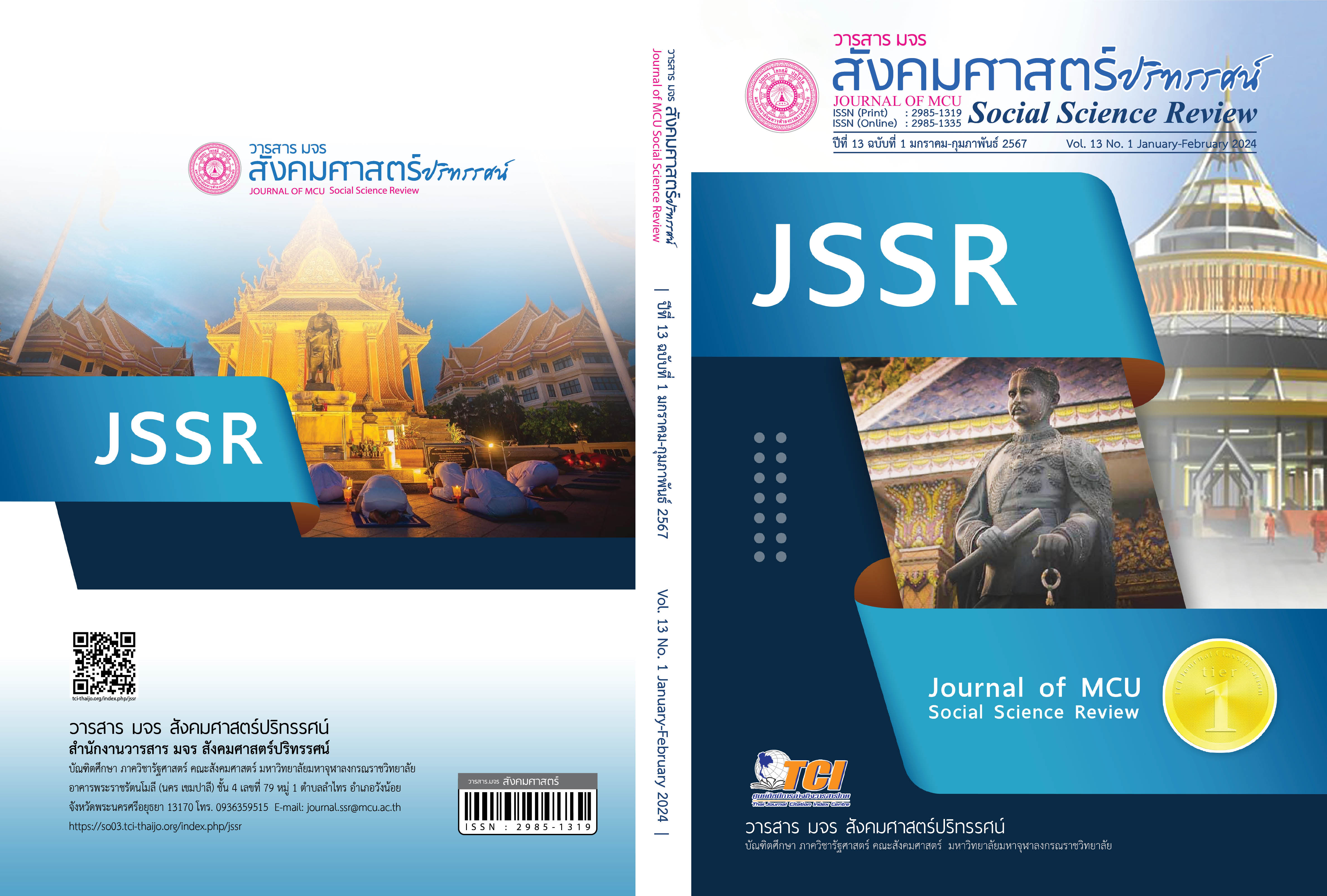ปรากฎการณ์นักร้องกับผลสะเทือนทางการเมืองจากระบอบตุลาการภิวัฒน์ หลัง พ.ศ. 2549 – 2563
คำสำคัญ:
การร้องเรียน, ผลสะเทือนทางการเมือง, ตุลาการภิวัฒน์บทคัดย่อ
บทความวิจัยนี้มีวัตถุประสงค์ 1. ศึกษาบทบาทและลักษณะของผู้ร้องเรียนในปรากฏการณ์ทางการเมืองที่เกิดขึ้นภายหลัง พ.ศ. 2549-2563 2. ศึกษาถึงลักษณะผลสะเทือนจากการร้องเรียนในปรากฏการณ์ทางการเมืองที่เกิดขึ้นภายหลังปี พ.ศ. 2549-2563 เป็นการศึกษาวิจัยในเชิงพรรณนา (Descriptive Research) โดยใช้วิธีการศึกษาจากเอกสาร (Documentary Research)
ผลการศึกษาพบว่า 1. ลักษณะและบทบาทของผู้ร้องเรียนสามารถแบ่งได้สามกลุ่มดังนี้ หนึ่งผู้ร้องเรียนเฉพาะฝ่ายอำนาจรัฐ สองผู้ร้องเรียนทั้งฝ่ายรัฐและฝ่ายคู่ตรงข้ามของรัฐ และสามผู้ร้องเรียนต่อฝ่ายตรงข้ามกับจุดยืนทางการเมืองของตนเอง โดยลักษณะและบทบาทของผู้ร้องเรียนในกลุ่มที่ 1 และกลุ่มที่ 2 เป็นการทำหน้าที่ตรวจสอบอำนาจรัฐซึ่งเป็นการช่วยให้สังคมตื่นรู้ในประเด็นทางการเมือง ซึ่งเปรียบเสมือนการทำหน้าที่ในการมีส่วนร่วมในฐานะพลเมืองในระบอบประชาธิปไตย (Political Participation) ซึ่งแตกต่างกับลักษณะของผู้ร้องเรียนในกลุ่มที่ 3 ที่เป็นการบิดผันสิทธิตามกฎหมายเพื่อประโยชน์ส่วนตน เพื่อให้สถาบันทางการเมืองใช้กฎเกณฑ์ ระเบียบ ข้อบังคับ ซึ่งจะส่งผลให้เกิดประโยชน์แก่ตนเองในท้ายที่สุด 2. ผลสะเทือนทางการเมืองที่เกิดจากกลุ่มที่หนึ่งและสองก่อให้เกิดกระแสความตื่นตัวทางการเมือง นำไปสู่การตรวจสอบผู้ใช้อำนาจรัฐในประเด็นต่าง ๆ และเป็นการแสดงออกถึงหน้าที่ของปวงชนชาวไทยในรัฐธรรมนูญ โดยผลสะเทือนจากกลุ่มที่สามได้กลายเป็นปัจจัยในการสนับสนุนกระบวนการตุลาการภิวัตน์ ซึ่งไม่ได้เป็นการพิทักษ์รัฐธรรมนูญและประชาธิปไตย แต่เป็นการบิดผันให้อำนาจตุลาการเข้าแทรกแซงอำนาจจากกระบวนการทางการเมือง
เอกสารอ้างอิง
กมลวรรณ ชื่นชูใจ. (2563). ความคิดปีศาจ : นิติราษฎร์พรรคอนาคตใหม่กับการสร้างการเมืองแห่งความหวัง. CMU Journal of Law and Social Sciences, 13(2), 87-119.
กรุงเทพธุรกิจ. (2560). 3 นักร้อง (เรียน) แห่งทศวรรษ. สืบค้น 25 มกราคม 2565, จาก https://www.bangkokbiznews.com/blogs/columnist/115534
______. (2564). เปิดแฟ้มผลงาน 4 นักร้อง ชงองค์กรอิสระ ศาลพลิกโฉมหน้าการเมืองไทย. สืบค้น 25 มกราคม 2565, จาก www.bangkokbiznews.com/politics/971214
เข็มทอง ต้นสกุลรุ่งเรือง. (2565). เห็บหมัดตุลาการ. สืบค้น 25 มกราคม 2565 www.the101.world/tick-of-judicial-activism
จาตุรงค์ สุทาวัน และนวภัทร โตสุวรรณ์. (2563). ผลทางการเมืองที่เกิดจากคำพิพากษาของศาลรัฐธรรมนูญภายหลังการรัฐประหาร พ.ศ. 2549. วารสารนิติ รัฐกิจ และสังคมศาสตร์ สำนักวิชานิติศาสตร์ มหาวิทยาลัยราชภัฏเชียงราย, 5(1), 213-226.
เดอะโมเมนตั้ม. (2564). ชีวิตฉันไม่มีวันกลับไปเหมือนเดิมอีกแล้วบทสนทนาหลังออกจากเรือนจำของเอกชัย หงส์กังวาน. สืบค้น 26 มกราคม 2565, จาก https://shorturl.asia/6ekmJ
บีบีซีนิวส์. (2561). ใครโกง โทรหา คสช. รวมดาวนักร้อง (เรียน) เอาไหมกับเบอร์นี้. สืบค้น 26 มกราคม 2565, จาก https://www.bbc.com/thai/thailand-43470127
______. (2562). ประวิตร มิตรหายกลายเป็นศัตรูสังคมอยากรู้นาฬิกามาจากไหนชอบใจ CSI LA. สืบค้น 26 มกราคม 2565, จาก https://www.bbc.com/thai/thailand-42748533
______. (2564). ศาลรัฐธรรมนูญ : การเมืองไทยไปทางไหนต่อหลังคำวินิจฉัย ชุมนุมเรียกร้องปฏิรูปสถาบันกษัตริย์มีเจตนาซ่อนเร้นล้มล้างการปกครอง. สืบค้น 26 มกราคม 2565, จาก https://www.bbc.com/thai/thailand-59247579
ประชาไทออนไลน์. (2561). เอกชัย โดนสาดน้ำปลาร้าใส่ระหว่างเดินไปมอบของขวัญวันเกิดให้ประวิตร. สืบค้น 26 มกราคม 2565, จาก www.prachatai.com/journal/2018/08
ปิยบุตร แสงกนกกุล. (2562). ศาลรัฐประหาร : ตุลาการ ระบอบเผด็จการ และนิติรัฐประหาร. กรุงเทพฯ: ฟ้าเดียวกัน.
ผู้จัดการออนไลน์. (2562). เปิดอก พี่ศรี (สุวรรณ) จรรยา กับคำถามร้องทุกวัน แล้วทำมาหากินอะไร? และมุมติสท์ ๆ ของผู้ชายรัก ศิลปะ ครุฑ ต้นไม้. สืบค้น 26 มกราคม 2565, จาก https://mgronline.com/daily/detail/9620000042518
มติชนออนไลน์. (2564). 85 นักวิชาการ ม.ดังทั่วประเทศ ร่อนแถลงการณ์แย้งคำวินิจฉัยคดีล้มล้างการปกครอง. สืบค้น 25 มกราคม 2565, จาก 2565 https://shorturl.asia/89zpm
วอยซ์ออนไลน์. (2564). มุมมอง วรเจตน์ ภาคีรัตน์ ต่อคำวินิจฉัยศาลรัฐธรรมนูญคดีล้มล้างการปกครองของ 3 ราษฎร. สืบค้น 26 มกราคม 2565, จาก www.voicetv.co.th/read/xBxqDbJ6
วีระ หวังสัจจะโชค (2556). การจัดสถาบันของนโยบายจำนำข้าว (ดุษฎีนิพนธ์ปรัชญาดุษฎีบัณฑิต สาขารัฐศาสตร์). กรุงเทพฯ: จุฬาลงกรณ์มหาวิทยาลัย.
สมชาย ปรีชาศิลปกุล. (2559). การเมืองเชิงตุลาการ. วารสารนิติสังคมศาสตร์, 9(1), 82-125.
______. (2562) เมื่อตุลาการเป็นใหญ่ในแผ่นดิน. กรุงเทพฯ: บุ๊คสเคป.
Cornwall, A. & Coelho, V. S. (2006). Space for Change? Representation, Inclusion and Voice in New Democratic Arenas. London: Zed books.
Dahl, R. A. (2005). Who governs?: Democracy and power in a American city. New Heaven, CT: Yale University Press.
Dalton, R. (2008). Citizenship Norms and the Expansion of Political Participation. Political Studies, 50(1), 76-98.
Fukuyama, F. (2006). The End of History and the Last Man. New York, NY: Simon and Schuster.
Ginsburg, T. (2003). Judicial Review in New Democracies. New York: Cambridge University Press, 2003.
Hall, P.A. & Taylor, C.R. (1996). Political Science and the Three New Institutionalisms. Political Studies. XLIV.
Hirschl, R. (2006). The New Constitution and the Judicialization of Pure Politics Worldwide, Fordham. Law Review, 75(2), 721-53.
______. The Judicialization of Mega-Politics and the Rise of Political Courts. Annual Review of Political science, 11, 93-118.
Lowndes, V. (2002). Institutionalism. in Marsh, D. and Stoker, G. (Eds) Theory and Methods in Political Science. Hound mills: Palgrave.
ดาวน์โหลด
เผยแพร่แล้ว
รูปแบบการอ้างอิง
ฉบับ
ประเภทบทความ
สัญญาอนุญาต
ลิขสิทธิ์ (c) 2024 วารสาร มจร สังคมศาสตร์ปริทรรศน์

อนุญาตภายใต้เงื่อนไข Creative Commons Attribution-NonCommercial-NoDerivatives 4.0 International License.
เพื่อให้เป็นไปตามกฎหมายลิขสิทธิ์ ผู้นิพนธ์ทุกท่านต้องลงลายมือชื่อในแบบฟอร์มใบมอบลิขสิทธิ์บทความให้แก่วารสารฯ พร้อมกับบทความต้นฉบับที่ได้แก้ไขครั้งสุดท้าย นอกจากนี้ ผู้นิพนธ์ทุกท่านต้องยืนยันว่าบทความต้นฉบับที่ส่งมาตีพิมพ์นั้น ได้ส่งมาตีพิมพ์เฉพาะในวารสาร มจร สังคมศาสตร์ปริทรรศน์ เพียงแห่งเดียวเท่านั้น หากมีการใช้ภาพหรือตารางหรือเนื้อหาอื่นๆ ของผู้นิพนธ์อื่นที่ปรากฏในสิ่งตีพิมพ์อื่นมาแล้ว ผู้นิพนธ์ต้องขออนุญาตเจ้าของลิขสิทธิ์ก่อน พร้อมทั้งแสดงหนังสือที่ได้รับการยินยอมต่อบรรณาธิการ ก่อนที่บทความจะได้รับการตีพิมพ์ หากไม่เป็นไปตามข้อกำหนดเบื้องต้น ทางวารสารจะถอดบทความของท่านออกโดยไม่มีข้อยกเว้นใดๆ ทั้งสิ้น





